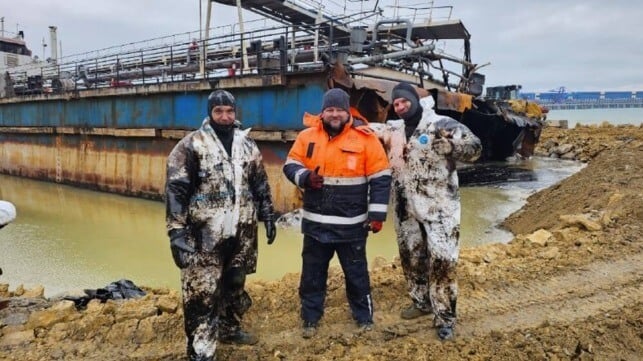Russian Fuel Oil Spill Sickens 150 Cleanup Workers

When two tankers broke up and spilled thousands of tonnes of heavy fuel oil near Kerch Strait last month, thousands of volunteers responded to help clean up the mess on the beaches in Krasnodar. According to Krasnodar Region Health Minister Yevgeny Filippov, nearly 150 of the responders have reported symptoms of exposure to hazardous fumes, despite claims by some Russian officials that low winter temperatures negated the risk of off-gassing.
In mid-December, the aging river-sea tanker Volgoneft-212 sank in a severe storm about five nautical miles outside of the Kerch Strait. Sister ship Volgoneft-239 went aground on a rocky shore off Taman shortly after, and it also broke up and spilled fuel.
Filippov told regional outlet 93.ru that 146 volunteers who joined in the cleanup work in Krasnodar have sought medical help for chemical exposure symptoms since the start of the cleanup. Three were treated in a hospital, and 14 extra beds with an oxygen supply were set aside for oil-vapor poisoning patients in Anapa. All those who sought help had been discharged as of January 15, he said.
Some of the victims worked in cloth masks and fabric gloves, which provide little to no protection from petroleum exposure. The outlet noted that rubber protective garments and a respirator mask are required for safety during a spill cleanup, but volunteers reported informal utilization and variable levels of available protective gear at each beach site.
Volunteers who spoke to 93.ru about their symptoms reported skin burns from contact with the viscous fuel oil, along with nausea, headaches, persistent breathing difficulty, and a taste of oil in the mouth. Some reported drinking a medical sorbent solution, a Russian product known as Polisorb, as a precaution during work.
"I am still recovering, shortness of breath — as if I had COVID," one volunteer told the outlet.
Among the reported victims is volunteer Larisa Shultz, who became well-known on social media after a video of a swan she cleaned up went viral. According to Shultz's social media account, she required IV treatment after she was overcome by fume exposure.
Anapa: swan rescued from oil spill hugs volunteer who helped it
— Novaya Gazeta Europe (@novayagazeta_en) January 15, 2025
A swan rescued by volunteers in Anapa, a resort town in the Krasnodar region hit hardest by the recent oil spill in the Black Sea, has been caught on video “thanking” the woman who helped save it, the TikTok account… pic.twitter.com/zzQqINfWEF
"If I knew that helping birds would turn out like this, would I help? Yes," Shultz said in an Instagram post. "Now I'm saving myself. Everything is under control. Basically, three IVs are left."
Mazut (M100) is a residual fuel oil comparable to No. 6, also known as Bunker C. It comes in several different sulfur-content grades, but like all bunker fuels, it has no set ingredients list - only specifications for its technical properties. For cost reasons, chemical waste streams are often blended into heavy fuel oil as a disposal method, and these contaminants are present at elevated levels in about five percent of all bunker fuel, according to global testing company Intertek.
Wreck cleanup makes progress
Russia's federal Marine Rescue Service is overseeing cleanup work at the wreck sites of the two tankers. Both broke up at anchor during heavy weather, the service clarified Saturday, torn apart by forces that the 50-year-old inland vessels were not reportedly designed to withstand. The bow sections sank immediately while the two stern sections drifted downwind "over large distances."
Volgoneft-239's stern ran aground in Krasnodar, six miles from her bow, and her breakup was initially reported as a "grounding." Over the course of the past month, responders bulldozed a road to the wreck and created an embankment of dirt and rock to surround the wreck, encircling the entire section and preventing any further spillage into the sea. Work is under way to pump off the remaining fuel oil from its cargo tanks.
Efforts to contain the Volganeft-239 oil spill continue with a new barrier in place. Cleanup ongoing in the Kerch Strait.
— NoComment (@nocomment) January 17, 2025
For more #nocomment videos > https://t.co/f4lUW8IpTG pic.twitter.com/oBleuU7VUl
Russia's government says that this is the first known marine spill of mazut, and that cleanup techniques are still being developed. A similar spill of mazut from a similar tanker breakup in Kerch Strait occurred in 2007.
